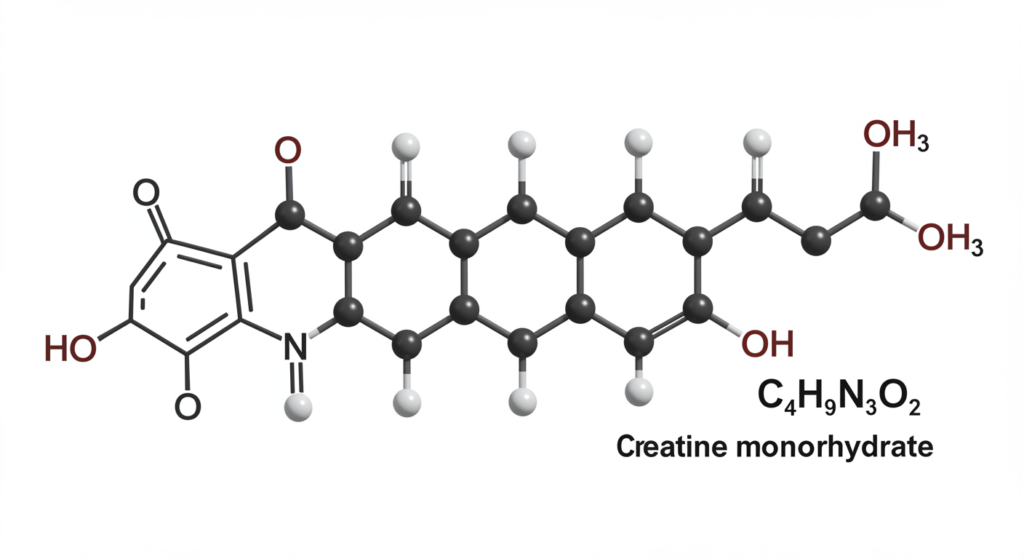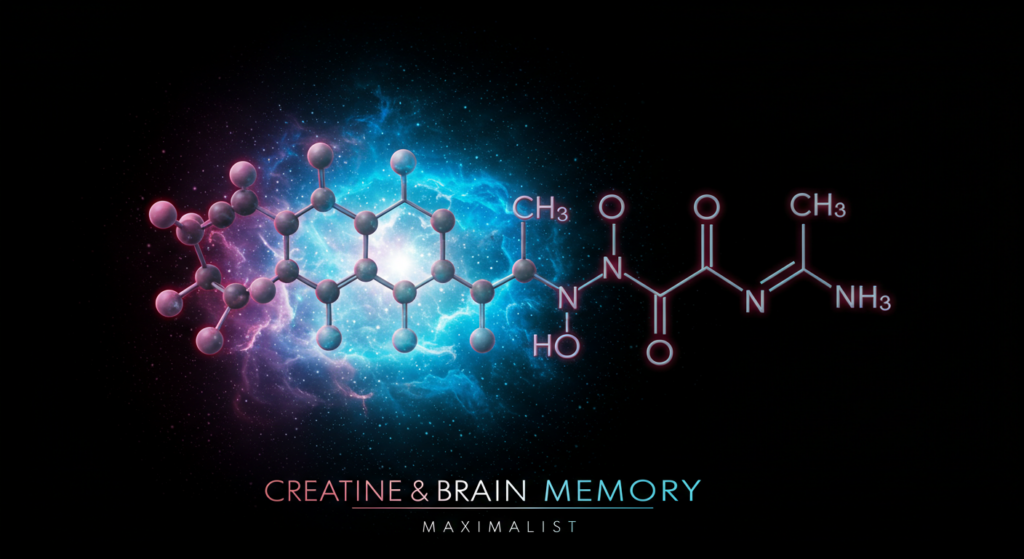Creatine: The Brain Booster Beyond Muscle Growth
Introduction: The Untold Story of Creatine
When most people hear the word “creatine,” they immediately think of bodybuilders and athletes looking to gain muscle mass. While creatine has certainly earned its reputation as one of the most effective supplements for enhancing physical performance and building lean muscle, its benefits extend far beyond the weight room. In recent years, scientific research has uncovered compelling evidence that creatine supplementation may provide significant advantages for brain health and cognitive function, opening up new possibilities for its use among a broader population.
What Is Creatine? Understanding the Basics
Before diving into the cognitive benefits, let’s clarify what creatine actually is. Creatine is a naturally occurring compound formed from amino acids that is found primarily in muscle cells, where it helps produce energy during high-intensity exercise or heavy lifting. The human body produces about 1-2 grams of creatine daily in the liver, kidneys, and pancreas, while the average person consumes an additional 1-2 grams through diet, mainly from animal products like meat and fish.

Creatine works by increasing the body’s stores of phosphocreatine, which helps regenerate adenosine triphosphate (ATP)—the primary energy carrier in cells. This energy system is particularly important during short bursts of high-intensity activity, which is why creatine has become a staple supplement for strength and power athletes.
The Brain-Creatine Connection: How Does It Work?
Interestingly, after skeletal muscle, the brain is the second-highest consumer of creatine in the human body. Just like muscles, brain cells require substantial energy to function optimally. Here’s how creatine supports brain function:
- Energy Production: The brain consumes approximately 20% of the body’s energy despite accounting for only 2% of its weight. Creatine helps maintain ATP levels in brain cells, providing the energy necessary for optimal cognitive function.
- Neuroprotection: Research suggests creatine may help protect neurons from damage caused by oxidative stress and energy depletion, potentially reducing the risk of neurodegenerative diseases.
- Neurotransmitter Support: Creatine may influence the levels and activity of important neurotransmitters like dopamine and serotonin, which play crucial roles in mood regulation and cognitive processing.
Cognitive Benefits Backed by Science
Recent studies have demonstrated several ways creatine supplementation may enhance cognitive function:
Improved Memory and Intelligence
Research published in the Proceedings of the Royal Society found that vegetarians who took creatine supplements for six weeks showed a 25-50% improvement in memory and intelligence tests. Since vegetarians typically consume less dietary creatine than meat-eaters, this study suggests that maintaining optimal creatine levels may be particularly beneficial for cognitive function in individuals with lower baseline levels.

Enhanced Processing Speed and Decision Making
A study in the Clinical Neurophysiology journal demonstrated that creatine supplementation improved brain performance, particularly in tasks requiring speed of processing. Participants showed faster neural processing and improved performance in tasks requiring rapid decision-making after just seven days of creatine supplementation.
Reduced Mental Fatigue
Research published in Neuroscience Research found that creatine supplementation reduced mental fatigue when subjects performed challenging mathematical calculations. During prolonged mental activity, brain creatine levels can become depleted, leading to cognitive fatigue. Supplementation appears to delay this depletion, allowing for sustained cognitive performance over longer periods.
Benefits Under Stress and Sleep Deprivation
A particularly interesting finding comes from research on sleep deprivation. A study published in Psychopharmacology found that creatine supplementation helped mitigate the negative effects of sleep deprivation on cognitive performance, mood, and central fatigue. This suggests potential applications for individuals whose cognitive performance suffers due to sleep restriction or stress.
Potential Applications for Specific Populations
The cognitive benefits of creatine may be particularly relevant for certain groups:
Older Adults
As we age, cognitive decline becomes a concern for many. Some research suggests creatine supplementation might help maintain cognitive function in older adults by supporting cellular energy production in the brain. A study in Neurology found that creatine supplementation improved memory and recall in older adults, suggesting a potential role in cognitive preservation during aging.
Vegetarians and Vegans
Since dietary creatine comes primarily from animal products, vegetarians and vegans often have lower creatine levels than omnivores. Research suggests these individuals may experience more pronounced cognitive benefits from creatine supplementation due to their lower baseline levels.
Students and Knowledge Workers
Anyone engaged in mentally demanding tasks might benefit from creatine’s cognitive support. Students studying for exams, professionals working long hours, or anyone facing cognitive challenges may find that creatine helps maintain mental clarity and reduces cognitive fatigue.
Individuals with Neurological Conditions
Preliminary research suggests creatine might offer neuroprotective benefits for individuals with certain neurological conditions. While more research is needed, studies are investigating its potential role in conditions like Alzheimer’s disease, Parkinson’s disease, and traumatic brain injury.
How to Incorporate Creatine for Cognitive Benefits
If you’re interested in exploring creatine’s cognitive benefits, here’s what you should know:
Dosage Considerations
The most common protocol for creatine supplementation is:
- Loading phase: 20 grams per day (divided into 4 doses of 5 grams) for 5-7 days
- Maintenance phase: 3-5 grams per day thereafter
However, for cognitive benefits specifically, research typically uses doses of 5 grams per day without a loading phase. This appears sufficient to elevate brain creatine levels over time.
Form and Timing
Creatine monohydrate is the most researched and cost-effective form of creatine. For cognitive benefits, consistency matters more than timing—taking your daily dose at approximately the same time each day ensures stable creatine levels.
Hydration Is Key
Creatine causes cells to draw in water, so proper hydration is essential when supplementing. Aim to drink plenty of water throughout the day.
Combining with Other Cognitive Enhancers
Some evidence suggests creatine may work synergistically with other cognitive-supporting compounds like omega-3 fatty acids, B vitamins, and antioxidants. A well-rounded approach to cognitive health should include proper nutrition, regular exercise, quality sleep, and stress management.
Safety Profile and Considerations
One of creatine’s greatest advantages is its exceptional safety profile. It is one of the most extensively studied supplements, with research consistently demonstrating its safety for most healthy individuals when used as directed.
Common misconceptions about creatine include concerns about kidney damage, dehydration, and cramping. However, research has repeatedly shown these concerns to be largely unfounded in healthy individuals. That said, those with pre-existing kidney conditions should consult with a healthcare provider before supplementing.
Some individuals may experience mild digestive discomfort when beginning supplementation, which typically resolves by taking smaller, more frequent doses or consuming creatine with meals.
The Future of Creatine Research
The field of creatine research continues to evolve, with exciting developments on the horizon:
- Formulation Improvements: Researchers are exploring new delivery methods to enhance creatine bioavailability and uptake in the brain.
- Targeted Applications: Studies are investigating specific protocols for different populations and cognitive needs.
- Combination Therapies: Research is examining how creatine might work synergistically with other compounds to enhance cognitive function.
- Neurological Applications: Ongoing studies are exploring creatine’s potential role in preventing or managing neurodegenerative conditions.
Conclusion: Rethinking Creatine’s Role
The emerging research on creatine’s cognitive benefits challenges the traditional view of this supplement as solely for athletes and bodybuilders. As our understanding expands, creatine may become recognized as a valuable tool for supporting brain health and cognitive performance across diverse populations.
Whether you’re a student facing exams, a professional dealing with demanding cognitive tasks, an older adult concerned about cognitive decline, or simply someone looking to optimize brain function, creatine supplementation may offer meaningful benefits beyond the gym.
As with any supplement, individual results may vary, and it’s always advisable to consult with a healthcare provider before beginning supplementation, particularly for individuals with pre-existing health conditions. However, given creatine’s strong safety profile and growing evidence base for cognitive benefits, it represents one of the most promising supplements for brain health currently available.
Frequently Asked Questions (FAQs)
1. Can creatine really help with brain function?
Yes, scientific research indicates creatine can support cognitive functions including memory, intelligence, and mental processing speed. The brain uses significant amounts of creatine for energy production, similar to how muscles use it.
2. Who might benefit most from creatine’s cognitive effects?
Vegetarians, vegans, older adults, students, and professionals engaging in mentally demanding work may experience the most noticeable cognitive benefits from creatine supplementation.
3. Is creatine safe for long-term use?
Extensive research has shown creatine to be safe for long-term use in healthy individuals. It is one of the most thoroughly studied supplements with an excellent safety profile.
4. Will creatine make me gain weight?
Creatine may cause a small increase in water weight (1-3 pounds) as it draws water into muscle cells. This is not fat gain and is generally beneficial for both muscle and brain function.
5. How long does it take to see cognitive benefits from creatine?
Some studies show cognitive improvements within 7 days of supplementation, while others demonstrate effects after 4-6 weeks. Individual results may vary based on baseline creatine levels and other factors.
6. Do I need to cycle creatine supplementation?
Current research does not indicate a need to cycle creatine. Many individuals take it continuously for years without adverse effects.
7. Can women take creatine for cognitive benefits?
Absolutely. Creatine’s benefits extend to all genders, and women may experience the same cognitive improvements as men when supplementing.
8. Does creatine cause hair loss?
There is no strong scientific evidence linking creatine supplementation to hair loss. This concern stems from a single study showing a small increase in DHT (dihydrotestosterone) levels, but direct links to hair loss have not been established.
9. Is creatine only effective for people who exercise?
No, the cognitive benefits of creatine appear to be independent of exercise, though physical activity may enhance overall brain health and potentially work synergistically with creatine supplementation.
10. What’s the best form of creatine for cognitive benefits?
Creatine monohydrate is the most extensively studied form and offers excellent bioavailability at an affordable price. More expensive creatine forms have not consistently demonstrated superior cognitive benefit.

